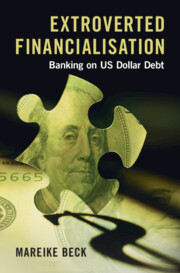
-
Select format
-
- Publisher:
- Cambridge University Press
- Publication date:
- 07 August 2025
- 21 August 2025
- ISBN:
- 9781009411790
- 9781009411813
- Dimensions:
- (229 x 152 mm)
- Weight & Pages:
- 0.48kg, 218 Pages
- Dimensions:
- Weight & Pages:
- Subjects:
- Economics, Macroeconomics, Economic Theory, History, Economic History
- Series:
- Studies in Macroeconomic History
You may already have access via personal or institutional login- Subjects:
- Economics, Macroeconomics, Economic Theory, History, Economic History
- Series:
- Studies in Macroeconomic History
Book description
Extroverted Financialization offers a new account of the Americanization of global finance through the concept of 'extroverted financialization'. The study presents German banks as active participants of financialization, demonstrating how deeply entangled they were with global markets since post-WWII reconstruction. Extroverted Financialization locates the transformation of global banking within the revolution of funding practices in 1960s New York and shows how this empowered US banks to systematically outcompete their European counterparts. This uneven competition drove German banks to partially uproot themselves from their own home markets and transform their own banking models into US financial models. This transformation not only led to the German banks' speculative investments during the 2000s subprime mortgage bubble, but more importantly to rising USD dependency and their contemporary decline.
Reviews
‘A fantastic achievement. Mareike Beck establishes herself as a central voice in the debate about changing European banking practices in response to the liability management funding techniques favoured by American banks since the 1960s. This is a carefully crafted book awash with subtle insights and crammed full of rich empirical detail. It significantly rewrites the received history of how German banks reconstituted themselves in a desperate attempt to avoid being left behind.'
Matthew Watson - University of Warwick
‘Mareike beck overturns the conventional wisdom about European and specifically German finance, showing that German banks internationalized well before the nominal end of the Bretton Woods System, and that the cozy hausbank story in much of comparative political economy is overstated.'
Herman Mark Schwartz - University of Virginia
‘Mareike Beck turns our understanding of German and European finance off its head and onto its feet. Everyone who seeks to understand the pre-history of 1990s’ financial globalization and its crushing consequences today should read this finely-researched book. A stellar contribution to contemporary scholarship on the political economy of finance.’
Daniel Mertens - Professor of International Political Economy, Osnabrück University
Contents
Metrics
Altmetric attention score
Full text views
Full text views help Loading metrics...
Loading metrics...
* Views captured on Cambridge Core between #date#. This data will be updated every 24 hours.
Usage data cannot currently be displayed.
Accessibility standard: WCAG 2.0 A
Why this information is here
This section outlines the accessibility features of this content - including support for screen readers, full keyboard navigation and high-contrast display options. This may not be relevant for you.
Accessibility Information
The PDF of this book conforms to version 2.0 of the Web Content Accessibility Guidelines (WCAG), ensuring core accessibility principles are addressed and meets the basic (A) level of WCAG compliance, addressing essential accessibility barriers.
Content Navigation
Table of contents navigation
Allows you to navigate directly to chapters, sections, or non‐text items through a linked table of contents, reducing the need for extensive scrolling.
Index navigation
Provides an interactive index, letting you go straight to where a term or subject appears in the text without manual searching.
Reading Order and Textual Equivalents
Single logical reading order
You will encounter all content (including footnotes, captions, etc.) in a clear, sequential flow, making it easier to follow with assistive tools like screen readers.
Short alternative textual descriptions
You get concise descriptions (for images, charts, or media clips), ensuring you do not miss crucial information when visual or audio elements are not accessible.
Structural and Technical Features
ARIA roles provided
You gain clarity from ARIA (Accessible Rich Internet Applications) roles and attributes, as they help assistive technologies interpret how each part of the content functions.

